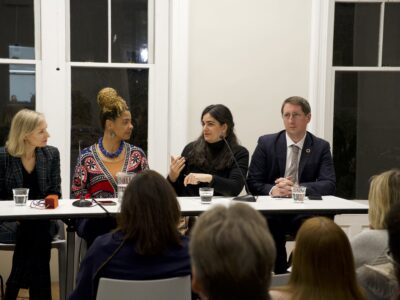
Jonathan Philipsborn (Class of 2007) is the Climate Adaption Practice Director for the Americas at AECOM, a multi-national consulting firm supporting clients across markets and sectors in over 150 countries.
Jon graduated from Kenyon College, a small liberal arts college in Ohio. He entered Columbia’s Environmental Science and Policy MPA (MPA-ESP) program to further his understanding of environmental issues beyond the science, beyond the policy, to address their very interdisciplinary nature. In addition to doing just that, Jon also met his future wife, Becca (Pass) Philipsborn in the program.
Given the recent occurrence of extreme weather events, some of which are related to climate change, we turn to Jon to understand how a leading consultancy company is working towards climate change adaptation practices. MPA-ESP Intern Anushree Kedia interviewed Jon to better understand his career path.
Tell us a little about your background, and what led to your interest in climate change.
During my four years at Kenyon College, I grew interested and became involved in researching birds. One opportunity led to another, and I ended up doing this for several years in locations across the continent and world. While doing so, I began exploring the broader implications of environmental change, not just in the context of avian populations, but in regards to the human-environment interface, and the impacts being felt across ecosystems and species. That interaction, and the desire to understand the systems beyond the science and the immediate environmental issues, the bigger picture deepened my interest in climate change.
My career after MPA-ESP included working for a US Senator and a large conservation NGO. During my fellowship at the US Senate working for then senior Montana Senator Max Baucus, my work focused on environmental policy creation and required communicating with a wide range of stakeholders. While short, I found my time spent in the Senate to be very valuable in better understanding the legislative process and how environmental issues are considered.
After my fellowship, I worked for Conservation International, a global NGO, for two years. There my focus was on climate change and land-use issues, mainly supporting the development of forest carbon projects that created climate, community and biodiversity benefits in some of the world’s biodiversity hotspots. This opportunity allowed me to work with world-renowned scientists in the areas of biodiversity and environmental issues, and deepened my understanding of how climate change, local communities, and the environment all interact—why we need to consider each in understanding challenges and creating solutions. I had the privilege of traveling globally and experiencing first-hand the local issues that contribute to global challenges as well as the impact of global problems on local populations and environments.
What is your role at AECOM? Has this changed given the recent extreme weather events, or the new administration in Washington?
I am currently Climate Adaption Practice Director for Americas at AECOM. Climate change services we provide to our clients include reviewing climate science, conducting climate change vulnerability and risk assessments, modeling potential future hazard conditions, and developing and implementing adaptation and resilience strategies. My responsibilities include helping clients understand what climate change means for them. Additionally, within AECOM, I am responsible for building teams of practitioners across multiple disciplines (including planners, scientists, engineers, architects, and economists) in order to address complex challenges. I also spend time communicating internally with account managers on the importance of climate change for the clients they serve so that they can better communicate about the issues with the people they work with.
In regards to the new administration, while it would most certainly be beneficial to have a champion in the White House, I can empirically say that we are busier than ever. Today, we continue to see momentum and action from cities, states, and companies that both have already committed to climate change initiatives and recognize the importance of better understanding the issues at hand. And though the federal government is not focusing directly on climate change, they are furthering their focus (in response to the recent extreme weather events) on building back better, and improving community resilience to future natural disasters.
Given the recent extreme weather events in Texas, Florida and the Caribbean, at AECOM our first priority was to ensure the safety and well-being of our own people, as well as our partners and clients. Our company has various post-disaster recovery and support processes which were utilized during and following these events. We support the local efforts to help with immediate recovery, helping communities get back on their feet and reopen, while also working to strengthen the areas affected through longer term planning and disaster resilience efforts. After the immediacy of addressing the basic needs, my personal opinion is that we need to use events like these recent hurricanes as teachable moments: how can we do better at preparing for natural disasters? What have we done in the past that worked well at minimizing impacts to communities, both people and property? How can we use events like these to further inform people about the effects of climate change; how warming temperatures and sea level rise may contribute to stronger and more frequent extreme weather events. It is important to make the connection.
In what ways did the MPA-ESP program prepare you for your career?
Even before my “career” really began, I knew that the MPA-ESP program was providing me tremendous value. From the connections I was making inside the School of International and Public Affairs (SIPA), to the professors, advisors, and opportunities to engage with a diverse range of organizations inside and out of Columbia. The program opened my eyes to career possibilities I hadn’t yet thought of, and gave me a knowledge foundation and level of confidence to go seek new and more challenging opportunities.
The MPA-ESP program was instrumental at further teaching me how to communicate complex scientific and environment issues to policy and decision makers. I learned the importance of incorporating a challenging environmental issue, such as climate change, within the public management, policy, and traditional environmental and engineering disciplines; in government large and local, and within business. With climate change, it is imperative to show why we should and how we can incorporate climate change considerations in our day-to-day decisions to create positive change, both in the public and private sector.
I look back fondly on my time as a student. I still draw upon the basic skills and knowledge gained in the MPA-ESP program (working together, communicating science, breaking down problems to build solutions) in my current work to collaborate across disciplines and address complex challenges.

What is a favorite memory from your days at Columbia?
This is an easy one. Obviously, the highlight of the program was meeting my wife, Becca (Pass) Philipsborn (MPA-ESP ’07). Not only did we bond over the workshop activity of developing a global surveillance network for avian influenza, we decided we’d like to spend the rest of our lives together! However, I think it is quite a testament to the program that in addition to meeting my life companion, I have a number of other lasting positive impressions.
Becca and I still maintain very meaningful friendships from our small ESP class, and while many of these people are spread across the country and world doing inspiring work, we take great joy in any opportunity we get to catch-up with or see them. In fact, this year we had our 10-year reunion anniversary! It was awesome to see so many of our colleagues return to the Morningside Heights for a fun weekend. I can say with confidence, 10 years later, the MPA-ESP program brought together a remarkable and diverse group of people, many if not most of whom are using their MPA-ESP degree in some form to support their own interesting and important work. I am truly grateful for that one-year I spent at SIPA.
Do you have advice for current MPA-ESP students interested in pursuing a career in climate change consulting?
There is a lot to be gained from any experience that you come across. Sustainability, climate change, and resilience, are all very broad topics, related in many ways. They are all also increasingly important topics in the minds of decisions makers at companies, and in all levels of government. There are opportunities to work in myriad parts of this broad arena and develop useful skills while making good connections. Gaining experience, meeting people, developing a network, will all further enable you to grow your career in a manner that is more aligned with your vision. Even if your first job isn’t “perfect,” even if your current title does not reflect your ideal vision, don’t get discouraged. Remember that your first job will not be your last job, and that you can make almost any experience a valuable and learning one. Be open to embrace opportunities; challenge yourself beyond your comfort zone. Remember that all of the time you spent in SIPA has prepared you, perhaps more than you recognize.



